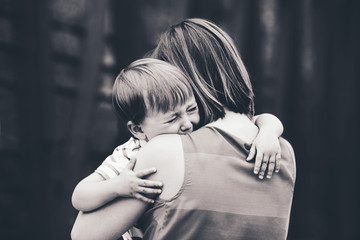You are in charge of your children, not in control of them.
 I was raised in the “stop crying or I’ll give you something to cry about” era. To say that I lacked a certain parenting finesse when my kids entered toddlerhood is an understatement. Shutting down my kids’ emotions and expecting them to calm at my request and convenience felt instinctively wrong, but it was the only parenting style I had to reference. I knew I was going to need to get help so I turned to Google, social media and books.
I was raised in the “stop crying or I’ll give you something to cry about” era. To say that I lacked a certain parenting finesse when my kids entered toddlerhood is an understatement. Shutting down my kids’ emotions and expecting them to calm at my request and convenience felt instinctively wrong, but it was the only parenting style I had to reference. I knew I was going to need to get help so I turned to Google, social media and books.
Now, if you’ve encountered us in public, you might question whether I’ve ever read a parenting book, let alone applied any principles found in one. Do my kids listen to me at home? No. But do they listen to me in public, especially in potentially dangerous situations? Also no. If there’s a magical phrase or formula to get your kids to listen, I certainly haven’t found it. Or my kids are monsters. Either way, I have learned a few helpful tools to calm a five-alarm toddler meltdown. And I’m not just talking about your average tantrum. I’m referring to the ones that have you making an appointment with the pediatrician and fearing that your kid will eventually channel that 3-year-old rage into adult self-destruction.
Acknowledging a crying child’s feelings is more than half the battle. “You’re mad I won’t let you play with this ink pen!” “You’re upset your brother won’t let you have a turn!” “You’re sad that dad told you it was time to come inside!” Kids are people too and function better when they feel understood. Moreover, they feel better when they have the words to express the emotions they’re feeling. This sounded silly to me the first time I read it. Then I thought about how it feels when my husband tells me to calm down and how disastrously ineffective that can be. So I tried the respectful approach on my raging toddler, and I’ll be darned, it worked.
Offering solutions once they’re calm and receptive is also key. “You can’t play with my ink pen, but we can get your crayons and coloring books!” “You’re upset we’re out of cookies, but let’s put them on our grocery list and you can pick whatever cookies you want at the store this weekend.” This not only teaches how to resolve the issue but also distracts a distraught toddler.
Giving them space. If nothing seems to be working and your kid is hell-bent on losing their mind, stay calm. Ask them if they want to be left alone. “Do you want mom to back off? I’m going to fold laundry but I’m still here if you need me. Come get me when you’re ready for a hug.” Let them have their tantrum while staying close by to make sure they’re not hurting themselves or destroying something you can’t replace.

Kids need to know that it’s ok to have and show emotions. They need you to give them the words to express them and they need an appropriate means of working through them. By acknowledging your kids’ feelings, you’re showing them respect as a person, which is something we all deserve.
So I survived the worst of toddlerhood and am now well into the preschool years, which is a whole new ballgame. I look at my defiant and creative little boys and think someday they are going to light the world on fire. Some days I worry they will literally light the world on fire. So today, I’m on the lookout for the next best parenting resource, any and all suggestions welcome.














Love this so much!!!! You’re lighting the world on fire with this approach.
Love this blog, a funny take on the world of raising children told in an engaging way.